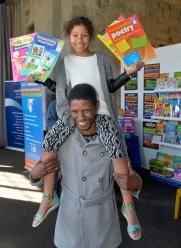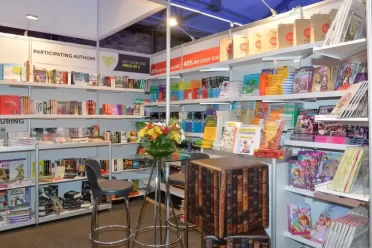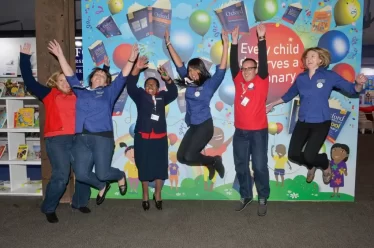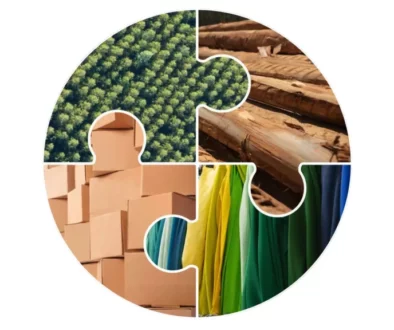Nurture a Reading Culture in SA – The Paper Story (PAMSA)
By Elitha van der Sandt
CEO of the South African Book Development Council
During our preparations for the 2019 edition of South African Book Fair, Stats SA released its General Household Survey (GHS) 2017. The results of the survey showed the alarming statistics that nearly half (47,6%) of children never read a book or drew (44,7%) with a parent or guardian.
It is research like this – along with studies like that showing nearly 80% of children in grade four cannot read and understand sentences in any language – that validates the South African Book Fair’s core mission to locate books and reading in the everyday lives of South Africans.
Indeed, it was to address the multitude of challenges in increasing access to books in South Africa that the South African Book Fair was conceived. While there are many dedicated and important initiatives celebrating books in South Africa, and a welcome flourishing of literary events, in 2017 the South African Book Development Council (SABDC) set out to revisit the concept and relevance of a national book fair in South Africa. In this, we were responding to mounting calls for a more reflective and representative showcase of South African (and African) literature and culture.
Arising out of this, SABDC committed to implementing a book fair that created greater access to the event for all South Africans, and dedicated itself to engaging audiences who ordinarily do not form part of mainstream book-industry events. Guided by this strategic vision, the inaugural South African Book Fair took place in Johannesburg in September 2017 – and, two years later, we’re proudly presenting a literary and activations programme and marketplace that significantly moves this vision forward. South African Book Fair is the culmination of National Book Week, initiated by SABDC in 2010, in association with the Department of Arts and Culture. Taking place from September 2 – 8, and celebrating 10 years in 2019, the campaign aims to mitigate findings of a 2006 study – repeated in 2016 – that showed a disturbing increase in the number of households in South Africa that do not own a single leisure reading book.
In 2019, the South African Book Fair has taken its place as a national industry platform to exhibit and showcase the book industry and its ancillary services.
As part of this, we place a strong emphasis on increasing access to the mainstream book industry through exhibition subsidies for SMMEs and entrepreneurs – from all provinces. Our Enterprise Development Programme focuses on skills development and transfer by industry experts, making SMMEs more competitive and able to penetrate the industry’s mainstream. An exhibitor subsidy and our belief in capacity building supports black, female-owned businesses in the sector – and, in the build-up to the Fair, we visit all provinces to ensure we are able to effectively do this. Creating and increasing access to new markets, and contributing to BBBEE within the book sector, are consistent threads in each Fair, as is ensuring South African Book Fair is a national platform for new talent and new business opportunities.
Importantly, the South African Book Fair reflects the demographics of South Africa and increases access and relevance for all citizens, fulfilling our vision to be the country’s most inclusive and diverse Fair.
This approach is visible across every aspect of the Fair, from our programming, to those working on each edition and our location – which, this year, sees us move to a new home at Constitution Hill in Johannesburg. Constitution Hill’s dynamic composition shapes a powerful new setting for us – the coming together of the South African Book Fair with a venue that celebrates the concept of lekgotla and is a heritage facility that tells the story of our country’s journey to democracy. Together, these create multiple ways to ponder and question with 2019’s literary and activations programmes having been carefully curated to facilitate lively and topical discussions around our central theme – #OURSTORIES.
As part of our passionate commitment to inclusivity and diversity, we provide a national platform for newly published literature, through representation of diverse writers, and by showcasing high quality local and indigenous language products. The latter, especially, provides an important link to the SABDC which has two important projects focusing on indigenous publishing and text editing in indigenous languages. By integrating these into the Fair, we are creating long-term, sustainable interventions in this vital aspect of the country’s book industry.
I say vital because the book industry still primarily serve a traditional market, mainly white buyers. There have been efforts by the industry to shift this, but it currently does not adequately represent South Africa. The book industry remains foreign to most South Africans.
The SABDC aims to position and better connect the book industry to all South Africans. Books are important to the country, and it is our aim, no matter the challenges, to bring books to more of the country’s citizens. In doing this, we need to acknowledge that there is an industry that is responsible for producing these books. Just because the industry has not been able to meet the needs of all South Africans does not mean that we should discount the role it plays, and will continue to play, in all aspects of development – social, educational, economic and political. A more informed citizenry will lead to greater economic growth, as people are able to intelligently interact with the world around them and actively participate in development in the country. It is important to note that the opportunities the fourth industrial revolution brings will not be available to the majority of South Africans. Seventy three percent of our adult population claims not to be interested in reading – how will they be able to participate in the fourth industrial revolution? As mentioned earlier, seventy eight percent of grade fours are unable to read for meaning. How will they be able to use these opportunities when they are unable to make meaning of words?
It is therefore our aim to demonstrate the importance of this industry, for collective strategies between industry and government, so that we can significantly change the reading figures. In essence, then, the South African Book Fair is a vehicle to connect this book industry, alien to the majority of South Africans, to more diverse audiences. Through these engagements the industry gets to know their untapped market better and can then better respond to, and serve the book needs, of the country. At its core, the South African Book Fair is transformative, inclusive and diverse in nature. Because that is what our country needs.
Against this background, it is my personal hope that, by 2025, there will be books and stories to be told in every home, and that families will see reading books together as valuable bonding time. I’m looking forward to a time when South Africans everywhere will be finding answers in books for life’s daily challenges – and will be picking up a book in high anticipation, expectant of the satisfaction that they will get from reading it.






